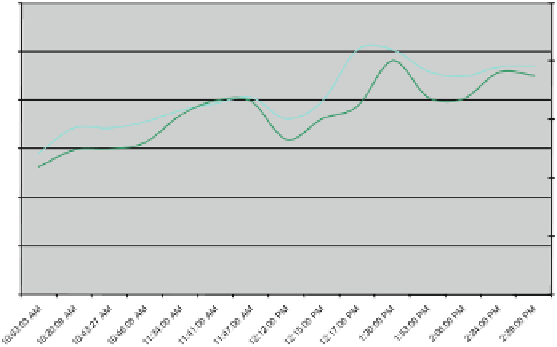Environmental Engineering Reference
In-Depth Information
Fuel Efficiency - 1 AUG 08
Off Board Power
Diesel Flow (GPH)
60
2.5
50
2
40
1.5
30
1
20
0.5
10
0
0
Fig. 12
Fuel efficiency and power (1 August 08)
Table 4 shows the use of the TGER Energy Conversion Model to analyze the per-
formance of the TGER on 1 August 08. Biofuels contributed 92.92% of the required
energy to generate electricity and diesel fuel contributed 7.08%. This shows that the
TGER can run almost entirely on biofuels, although the increase in biofuel contribu-
tion did have a negative affect on the thermal to electrical conversion efficiency. The
increase in the contribution of energy from biofuels lowered the thermal to electrical
conversion efficiency from 23% on 30 May 08 to 16.8% on 1 August 08, which is
attributable to the fact that the Kohler generator was specifically designed to run on
diesel, rather than biofuels.
5 Expert Commentary and Five Year View
The Tactical Garbage to Energy Refinery (TGER) is a trailerable, skid-mounted
device capable of converting waste products (paper, plastic, packaging and food
waste) into electricity via a standard 60 kW diesel generator. Additionally, the sys-
tem can utilize available local biomass as a feedstock. Waste materials are converted
into bio-energetics which displaces the diesel fuel used to power the generator set.
The system also co-produces excess thermal energy which can be further utilized
via a “plug and play” heat exchanger to drive field sanitation, shower, laundry or
cooling devices. With additional engineering, the TGER could include a small sub-
system to recover water introduced with the wet waste and produce potable water
to further reduce logistics overhead. The system requires a small “laundry packet”
of enzymes, yeasts and industrial antibiotics to support the biocatalytic subsystem.


Search WWH ::

Custom Search